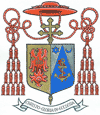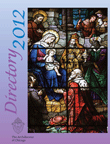
The Cardinal's Column
Francis Cardinal George, O.M.I.
Christmas: Knowing the One you love
Cardinal George's Schedule
- December 24: 5 p.m., Christmas Eve Holy Supper, Ukrainian Cultural Center; Midnight Mass, Holy Name Cathedral
- December 25: 9 a.m., Christmas Mass, Cook County Jail; 11 a.m., Children’s Memorial Hospital visit
- December 31: 11 a.m., 150th Anniversary St. Vincent de Paul Society, St. Vincent Center, 721 N. LaSalle
- January 4: 7:30 p.m., Meeting with Hispanic Deacon Candidates
- January 5: 3:15 p.m., Committee on Vocation Ministry Meeting
- January 6: 5 p.m., Archdiocesan Mass for Life, St. Stanislaus Kostka

Cardinal's Appointments
His Eminence, Francis Cardinal George announces the following appointments:
Pastor
Rev. Gary Graf to be pastor of Immaculate Conception Parish, Waukegan and Queen of Peace Parish, North Chicago while retaining duties as pastor of Holy Family Parish, Waukegan, effective immediately.
Administrator
Rev. Ronald Galt, from resident of St. Teresa of Avila Parish to administrator of the same, effective Dec. 30, 2006.
With the vast increase of information available from the communications explosion, I sometimes feel I am drowning in a sea of data. We are now able to know so much – about our work, about what is happening in the world, about sports, about music or the theater, about politics and public life, about financial results at all levels of enterprise. But the pile-up of facts does not always lead to greater understanding.
We all look for frameworks of interpretation in order to organize more coherently what we know. Love is the context in which we come to understand those we know more deeply because we have come to love them. A knowledge divorced from love remains humanly superficial, no matter how complicated or sophisticated a body of knowledge might seem. Knowledge without love can give an illusion of superiority, of enlightenment; but knowledge with love leaves us vulnerable. When someone or something we love is misrepresented, it’s painful.
Christmas is about coming to know a God who loves us and then learning to love him in return. When the God whom Jesus tells us to call “Father” is misrepresented, it’s painful because we love him. Today, after the discrediting of atheistic theories with the fall of communism, a militant and aggressive atheism is again showing its face. Its context of understanding is limited to a kind of scientism. The arguments used to show that God does not exist because he and his action cannot be scientifically quantified could, of course, be used to disprove the existence of love itself. None of the most basic facts of human life can be known only by using scientific method.
Christmas focuses on the birth of a child who is both God and man. When Jesus is misrepresented, it’s painful because we love him. Scholars who were once Christian sometimes turn their intelligence into liberating Jesus not only from the dogmas of the Church but also from the Scriptures and the Gospels. Against every attempt to drive a wedge between a supposed historical Jesus and the divine-human Savior whom we come to know in the Church and through her teachings, Christmas responds by telling us about the birth of Jesus and, at the same time, giving us clues as to who he is and why he comes. St. John in his Gospel tells us in sublime and theological terms what the loving, imaginative account of St. Luke means for the world in every age.
One night, in an obscure corner of Bethlehem, the eternal Son of God, the brightness of God’s splendor and the expression of God’s very being, was born as a baby: human, helpless, poor. God has spoken his deepest, most beautiful Word in Jesus, a Word that cannot be revoked, a Word that declares forever to each of us human beings: “I love you, I love your world, I love the human family and every man, woman and child.” This truth of how we are loved by God gives the drama of human history and our human condition its significance and meaning.
At Christmas, we tell the story of how Jesus is God-with-us, and we learn again to know where to look for him, how to recognize him and respond to his love. He came and involved himself in our world as it is, content to be no better off than we are. His coming did not cut through the red tape of the bureaucracy of the Roman conquerors of the Palestine of his day. It did not melt the heart of the wicked King Herod, who tried to kill him. Like any child, he depended on a mother’s love, on a father’s care. He had no wealth except what strangers gave him. He was born in a backwater and immediately became a victim of the intrigue of power politics, a refugee and an immigrant.
As at Bethlehem, “when the world did not know who he was,” his coming now is also hidden except to eyes of faith and hearts filled with love. His life is hidden in the Church, in the ancient words of the Gospels, in the sacred signs of Eucharist and sacraments. His is the real and effective presence of God, a saving, protecting, healing presence, a presence of love that can be neither contained nor destroyed. Because he is not seen or loved except in faith, those in sorrow or pain or bitterness are sometimes driven to cry out: “Where is God?”
For one day at least, at Christmas, we are at our best, with the miracle of so much singing and laughing and talking, the joy of giving, the pleasure of receiving. So much affection and memory and prayer come together. We know then that there is a goodness in the world that no amount of human malice can destroy, because heaven has come down to each in a tiny child who is son of God and son of Mary. We come to know again that, in spite of everything, the goodness and love that is God’s gift can explode with a happy fallout of thoughtfulness and kindness and effort and tolerance and patience and hope for peace. The light shines, and the darkness is shamed off the face of the earth on Christmas Day.
Then we know the truth of that Word of hope which God spoke from all eternity and which was born in Bethlehem. That Word tells us, “Even if all else collapses, my love is with you, surrounds you, touches your life in all sorts of ways. My love forgives and heals you; my love will never leave you or let you down.”
A merry Christmas and a blessed New Year to all of you.
Sincerely yours in Christ,
Francis Cardinal George, OMI
Archbishop of Chicago



